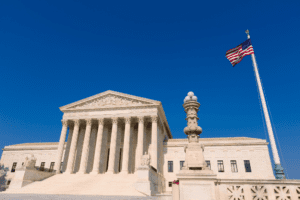 The dissent continued: I repeat that I do not cite these arguments in order to relitigate Heller. I wish only to illustrate the difficulties that may befall lawyers and judges when they attempt to rely solely on history to interpret the Constitution. In Heller, we attempted to determine the scope of the Second Amendment right to bear arms by conducting a historical analysis, and some of us arrived at very different conclusions based on the same historical sources. Many experts now tell us that the Court got it wrong in a number of ways. That is understandable given the difficulty of the inquiry that the Court attempted to undertake.
The dissent continued: I repeat that I do not cite these arguments in order to relitigate Heller. I wish only to illustrate the difficulties that may befall lawyers and judges when they attempt to rely solely on history to interpret the Constitution. In Heller, we attempted to determine the scope of the Second Amendment right to bear arms by conducting a historical analysis, and some of us arrived at very different conclusions based on the same historical sources. Many experts now tell us that the Court got it wrong in a number of ways. That is understandable given the difficulty of the inquiry that the Court attempted to undertake.
The Court’s past experience with historical analysis should serve as a warning against relying exclusively, or nearly exclusively, on this mode of analysis in the future. Failing to heed that warning, the Court today does just that. Its near-exclusive reliance on history will pose a number of practical problems. First, the difficulties attendant to extensive historical analysis will be especially acute in the lower courts. The Court’s historical analysis in this case is over 30 pages long and reviews numerous original sources from over 600 years of English and American history. Ante, at 30–62. Lower courts—especially district courts—typically have fewer research resources, less assistance from amici historians, and higher caseloads than we do. They are therefore ill equipped to conduct the type of searching historical surveys that the Court’s approach requires.
Tellingly, even the Courts of Appeals that have addressed the question presented here (namely, the constitutionality of public carriage restrictions like New York’s) “have, in large part, avoided extensive historical analysis.” Young v. Hawaii, 992 F. 3d 765, 784–785 (CA9 2021) (collecting cases). In contrast, lawyers and courts are well equipped to administer means-end scrutiny, which is regularly applied in a variety of constitutional contexts, see supra, at 24–25.
The dissent’s claim that over-reliance on history leads the Court’s members to reach very different conclusions might be disingenuous. The Court’s members routinely reach very different conclusions regardless of their reliance on history in a given case. A review of most of the most recent decisions reveals numerous dissents and concurring opinions as opposed to unanimous decisions.
